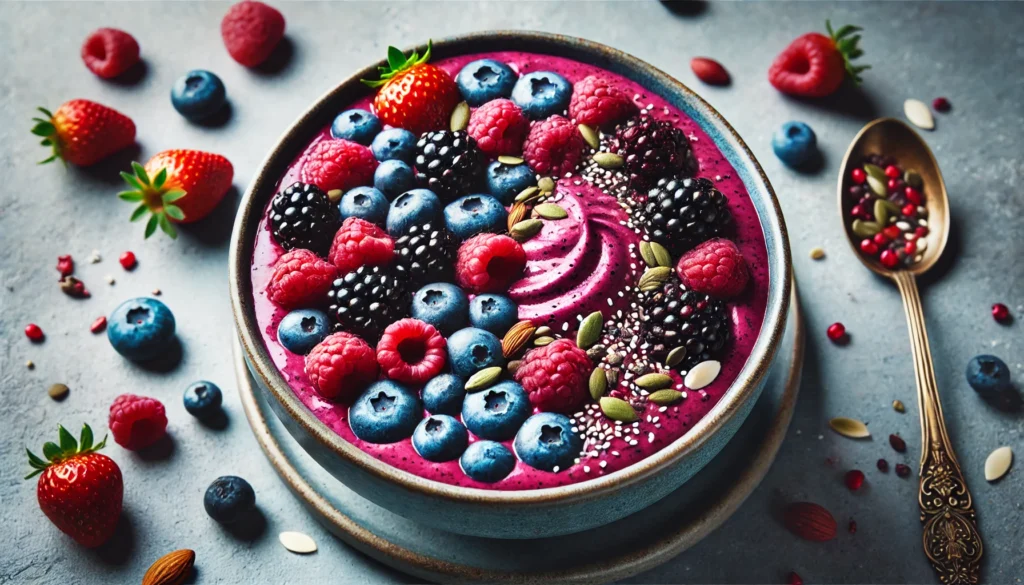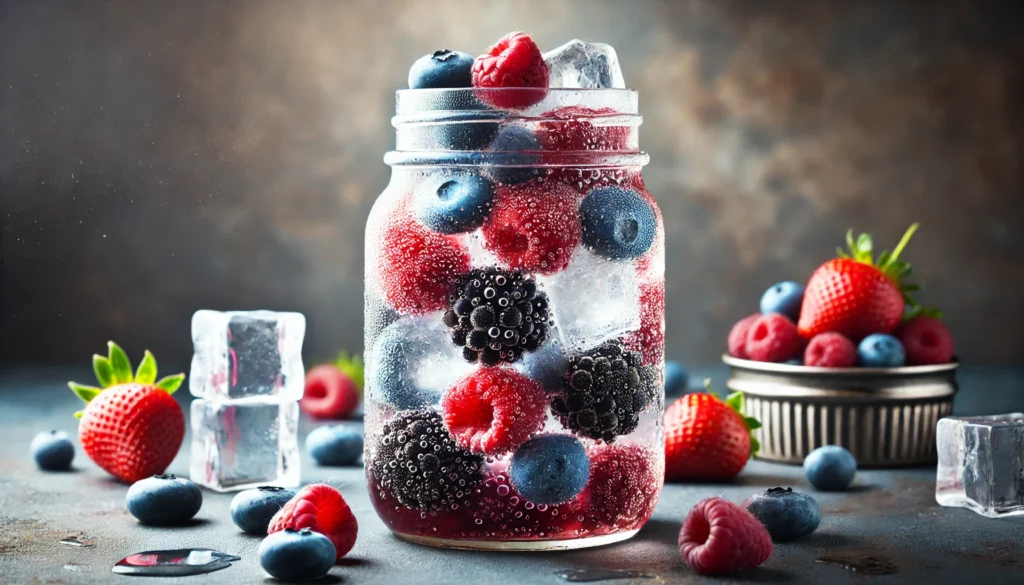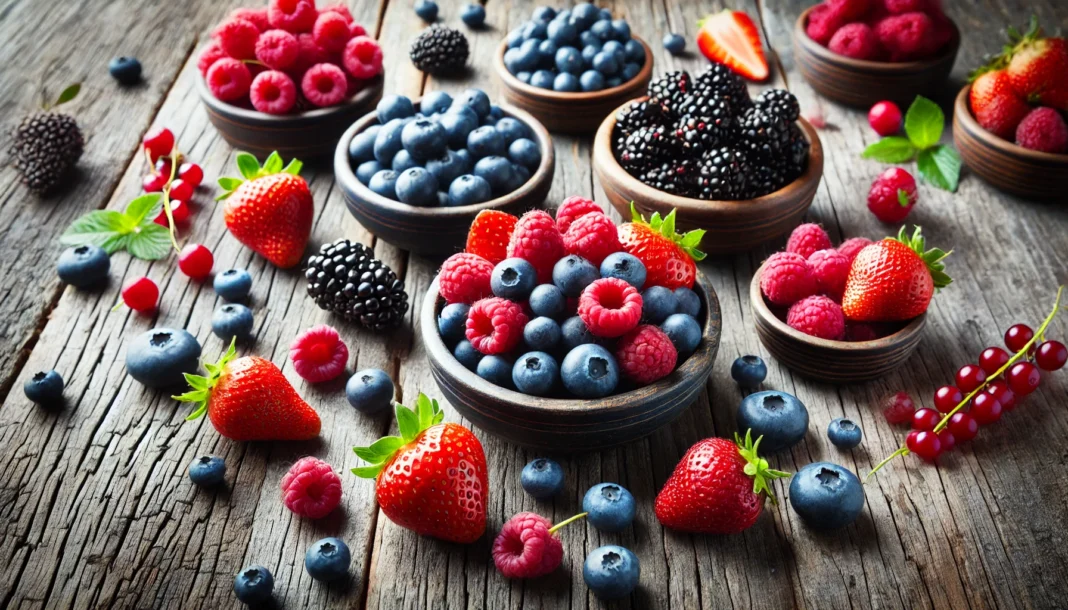The Power of Antioxidants in Berries
Berries are among the most nutrient-dense foods available, offering a rich array of vitamins, minerals, and phytonutrients that contribute to overall health. What makes berries particularly valuable is their high antioxidant content, which plays a crucial role in combating oxidative stress and reducing the risk of chronic diseases. These small yet powerful fruits are packed with polyphenols, flavonoids, and anthocyanins, which collectively enhance cellular protection and promote longevity. Consuming berries high in antioxidants can significantly improve health by reducing inflammation, improving cardiovascular function, and protecting against neurodegenerative conditions.
The role of antioxidants in the body is to neutralize harmful free radicals—unstable molecules that contribute to cellular damage and aging. Free radicals are generated through metabolic processes, environmental toxins, and even stress. Without sufficient antioxidant intake, oxidative damage accumulates, increasing the risk of chronic illnesses such as heart disease, diabetes, and cancer. Antioxidant-rich berry consumption provides a natural and effective way to counteract these harmful effects. By regularly including berries with the most antioxidants in the diet, individuals can fortify their bodies against cellular damage while supporting overall vitality.
Different berries contain varying levels of antioxidants, with some standing out as particularly potent sources. The diversity of antioxidants within berries means that consuming a variety of them maximizes health benefits. For instance, the deep blue hue of blueberries signifies high anthocyanin content, while the vibrant red of raspberries indicates the presence of ellagic acid, a compound known for its anti-cancer properties. Understanding the unique benefits of various berries allows individuals to make informed dietary choices and optimize their antioxidant intake for enhanced health outcomes.
You May Also Like: How to Detox Your Body: Best Foods and Strategies for a Natural Cleanse
Blueberries: The Antioxidant Powerhouse
Among the most celebrated berries high in antioxidants, blueberries stand out due to their impressive nutrient profile and broad-spectrum health benefits. Blueberries are particularly rich in anthocyanins, which give them their characteristic blue-purple color and contribute to their strong antioxidant properties. These flavonoids have been linked to improved brain function, reduced risk of heart disease, and enhanced eye health. Studies have shown that regular consumption of blueberries can improve memory, cognitive performance, and even delay the onset of age-related neurodegenerative conditions such as Alzheimer’s disease.
In addition to their cognitive benefits, blueberries support cardiovascular health by reducing inflammation and improving blood vessel function. The polyphenols in blueberries help regulate blood pressure, reduce LDL cholesterol oxidation, and enhance overall circulation. The fiber content in blueberries further aids in cholesterol management and supports digestive health. Incorporating blueberries into the diet can be as simple as adding them to smoothies, oatmeal, or yogurt, ensuring consistent antioxidant intake and promoting long-term wellness.
Another remarkable benefit of blueberries is their role in skin health. The antioxidants present in blueberries protect the skin from oxidative stress caused by UV radiation and pollution. They also support collagen production, helping to maintain skin elasticity and reduce the appearance of wrinkles. By integrating blueberries into daily meals, individuals can nourish their skin from within while benefiting from their diverse range of health-promoting properties.

Strawberries: A Nutrient-Rich Superfood
Strawberries are another excellent source of antioxidants, offering high levels of vitamin C, flavonoids, and phenolic compounds that contribute to their health-boosting effects. Known for their bright red color and sweet taste, strawberries provide a wide range of benefits, including immune support, improved heart health, and enhanced skin vitality. Their vitamin C content alone makes them a powerful ally against oxidative stress, as this essential nutrient plays a key role in immune function, collagen synthesis, and cellular repair.
One of the standout attributes of strawberries is their ability to support cardiovascular health. Research has shown that the antioxidants in strawberries help lower blood pressure, reduce inflammation, and decrease the risk of heart disease. The presence of ellagic acid in strawberries also contributes to their anti-cancer properties by inhibiting the growth of cancerous cells and promoting cellular detoxification. Regular consumption of strawberries can significantly improve heart health, making them a valuable addition to any diet.
Strawberries also promote digestive health by providing a good source of dietary fiber, which aids in maintaining a healthy gut microbiome. Fiber supports regular bowel movements, prevents constipation, and promotes beneficial gut bacteria growth. Given their high water content, strawberries also help with hydration, further supporting digestion and metabolic function. Whether eaten fresh, blended into smoothies, or added to salads, strawberries offer a convenient and delicious way to boost antioxidant intake.

Raspberries: A Potent Source of Polyphenols
Raspberries are renowned for their exceptional antioxidant profile, with high levels of vitamin C, quercetin, and ellagic acid contributing to their impressive health benefits. These compounds play a crucial role in reducing inflammation, supporting immune function, and protecting against oxidative stress. Raspberries have been studied for their potential to reduce the risk of chronic diseases, including cancer, diabetes, and neurodegenerative disorders.
The fiber content in raspberries makes them particularly beneficial for digestive health. With one of the highest fiber-to-calorie ratios among fruits, raspberries promote gut regularity and support the growth of beneficial gut bacteria. The polyphenols in raspberries have also been shown to help regulate blood sugar levels, making them an excellent choice for individuals managing diabetes or insulin resistance. By consuming raspberries regularly, individuals can benefit from their natural ability to enhance metabolic health.
Additionally, raspberries support skin health by providing essential nutrients that combat oxidative damage. Their vitamin C content boosts collagen production, reducing the appearance of fine lines and wrinkles. Furthermore, the anti-inflammatory properties of raspberries help alleviate skin conditions such as acne and eczema. By including raspberries in the diet, individuals can support both internal and external well-being, ensuring comprehensive health benefits.

Frequently Asked Questions (FAQ) About Berries High in Antioxidants
1. What makes berries high in antioxidants stand out from other antioxidant-rich foods?
Berries high in antioxidants are unique because they offer a diverse combination of polyphenols, flavonoids, and vitamins in one natural package. Unlike many other antioxidant-rich foods, berries contain anthocyanins, which give them vibrant colors and provide exceptional protective benefits against oxidative stress. Additionally, berries with the most antioxidants, such as blueberries and blackberries, offer superior brain-protective effects, supporting cognitive function and memory retention. These antioxidant-rich berries also have a lower glycemic index compared to other fruits, making them an excellent choice for blood sugar management. The synergy between the fiber, vitamins, and antioxidants in berries makes them a particularly powerful tool for fighting inflammation and reducing the risk of chronic disease.
2. How do berries with the most antioxidants impact mental well-being and cognitive function?
Research suggests that consuming antioxidant-rich berries regularly can significantly benefit mental health and cognitive function. The flavonoids in berries, particularly anthocyanins and quercetin, have been linked to improved neurotransmitter function, reducing the risk of cognitive decline and conditions like Alzheimer’s disease. Antioxidants in berries help protect neurons from oxidative damage while enhancing synaptic plasticity, which is crucial for memory formation and learning. Additionally, these compounds reduce inflammation in the brain, which is often associated with mood disorders such as anxiety and depression. Many people report experiencing sharper focus and reduced brain fog after incorporating berries high in antioxidants into their diets consistently.
3. Are antioxidant-rich berries effective for reducing stress and improving sleep?
Yes, certain antioxidant-rich berries can play a role in stress reduction and better sleep quality. Blueberries and cherries, for instance, contain compounds that help regulate cortisol levels, the hormone responsible for stress. Additionally, berries with the most antioxidants have been found to promote better blood flow to the brain, which can aid relaxation and cognitive clarity. Some berries, such as tart cherries, contain natural melatonin, a hormone that supports sleep cycles. Pairing these berries with magnesium-rich foods, such as nuts and seeds, may further enhance relaxation and promote restful sleep. Incorporating berries into an evening snack can be a simple yet effective way to improve sleep hygiene naturally.
4. How do berries with the most antioxidants support exercise recovery and athletic performance?
Berries high in antioxidants can significantly enhance exercise recovery and performance by reducing oxidative stress and muscle inflammation. Intense physical activity generates free radicals, which can lead to muscle fatigue and delayed recovery if not neutralized. The polyphenols in antioxidant-rich berries help reduce muscle soreness and accelerate recovery by improving blood circulation and reducing oxidative damage. Additionally, the natural sugars in berries provide a quick, clean source of energy without causing rapid blood sugar spikes. Many athletes incorporate berry smoothies or antioxidant-rich berry snacks post-workout to maximize endurance, minimize inflammation, and support long-term physical performance.
5. What role do antioxidant-rich berries play in skin health and anti-aging?
Berries high in antioxidants contribute to youthful, radiant skin by fighting oxidative stress, which accelerates aging and contributes to wrinkles and sagging. Vitamin C-rich berries like strawberries help boost collagen production, which is essential for skin elasticity and firmness. The anthocyanins in blueberries protect the skin from UV damage and environmental pollutants that cause premature aging. Additionally, the hydrating properties of berries assist in maintaining skin moisture levels, reducing dryness and irritation. Regular consumption of antioxidant-rich berries can result in a healthier, more resilient complexion while slowing the signs of aging at a cellular level.
6. How do berries high in antioxidants support heart health beyond reducing cholesterol?
While berries are known for their ability to lower LDL (bad) cholesterol, their benefits for heart health go far beyond that. The flavonoids in antioxidant-rich berries improve arterial function by promoting nitric oxide production, which helps blood vessels relax and reduces blood pressure. Berries with most antioxidants also help prevent platelet aggregation, reducing the risk of blood clots that can lead to heart attacks or strokes. Additionally, the anti-inflammatory properties of polyphenols in berries contribute to overall cardiovascular protection by reducing arterial stiffness and improving circulation. Long-term consumption of antioxidant-rich berries has been associated with lower rates of heart disease and better overall heart function.
7. Can consuming antioxidant-rich berries help with blood sugar regulation and diabetes management?
Yes, berries high in antioxidants are particularly beneficial for individuals managing blood sugar levels due to their low glycemic impact and high fiber content. Unlike other fruits, which may cause rapid blood sugar spikes, berries slow glucose absorption, preventing sudden insulin fluctuations. The polyphenols in antioxidant-rich berries improve insulin sensitivity, which is crucial for individuals with prediabetes or type 2 diabetes. Additionally, these berries reduce oxidative stress in pancreatic cells, which play a key role in insulin production. Including berries with the most antioxidants in a balanced diet can help maintain stable blood sugar levels while offering a naturally sweet alternative to processed sugars.
8. How do environmental factors influence the antioxidant levels in berries?
The antioxidant content of berries can be influenced by factors such as soil quality, climate, and agricultural practices. Berries grown in nutrient-dense soil and exposed to ample sunlight tend to develop higher concentrations of antioxidants, particularly flavonoids. Organic farming methods often result in berries with the most antioxidants because the plants produce more protective compounds in response to natural stressors like pests and varying weather conditions. On the other hand, excessive pesticide use and soil depletion in conventional farming can lower the antioxidant potency of berries. Choosing organic, wild-grown, or locally sourced berries often ensures higher levels of beneficial compounds and fewer harmful residues.
9. How can antioxidant-rich berries be preserved without losing their nutritional value?
Proper storage methods can help maintain the antioxidant content of berries while extending their shelf life. Freezing berries is one of the best ways to preserve their antioxidants, as research shows that frozen berries retain most of their polyphenols and vitamins. However, prolonged exposure to air, excessive washing, or improper refrigeration can degrade their nutrient content over time. Dehydrating berries at low temperatures is another method that preserves antioxidants while creating a convenient, shelf-stable snack. When storing fresh berries, keeping them dry and in a breathable container in the refrigerator can help maintain their freshness and potency for longer periods.
10. What are the emerging trends in the health industry regarding antioxidant-rich berries?
The health and wellness industry is increasingly recognizing the therapeutic potential of antioxidant-rich berries, leading to new innovations and applications. Berries high in antioxidants are being incorporated into functional foods, including probiotic-rich berry yogurts, fermented berry beverages, and high-polyphenol berry extracts. Additionally, the skincare industry is leveraging berry antioxidants in serums, creams, and supplements aimed at protecting against environmental stressors. Scientific research continues to explore how berries with the most antioxidants may aid in gut microbiome support, cancer prevention, and even mental health therapy. As consumer awareness grows, the demand for sustainably sourced and nutrient-dense berry products is expected to rise, shaping future trends in health and nutrition.
Conclusion: Harnessing the Power of Antioxidant-Rich Berries
Berries high in antioxidants offer an incredible array of health benefits, ranging from enhanced cognitive function to improved cardiovascular health and vibrant skin. Their natural compounds provide powerful protection against oxidative stress, reducing the risk of chronic diseases and promoting longevity. By incorporating a variety of antioxidant-rich berry options into their diet, individuals can harness their full potential and enjoy a naturally fortified immune system, healthier digestion, and improved metabolic balance.
Choosing berries with the most antioxidants allows for an optimized approach to nutritional wellness. Whether consumed fresh, blended into smoothies, or added to meals, these nutrient-dense fruits provide a simple and delicious way to support overall health. As research continues to highlight the remarkable benefits of berries, their role as essential superfoods becomes increasingly evident. By making them a staple in daily nutrition, individuals can take proactive steps toward a healthier and more resilient body.
antioxidant superfoods, best berries for health, high-antioxidant fruits, health benefits of berries, natural detox foods, polyphenol-rich foods, how antioxidants work, anti-aging nutrition, best fruits for skin health, berry health benefits, brain-boosting foods, cardiovascular health foods, best sources of vitamin C, berries for diabetes management, best superfoods for immune health, how to eat more antioxidants, berries and gut health, anti-inflammatory foods, immune-boosting diet, natural skin care foods
Further Reading:
Bioactive Compounds and Antioxidant Activity in Different Types of Berries
Recent Studies on Berry Bioactives and Their Health-Promoting Roles
Berry Phenolic Antioxidants – Implications for Human Health?

